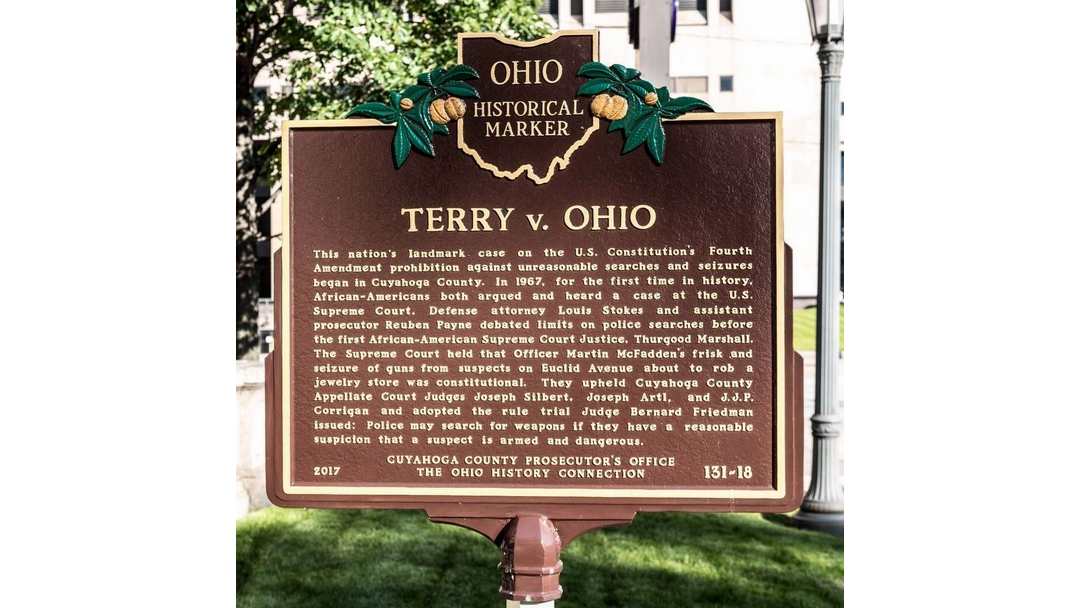Terry v. Ohio (1968)
Background
On October 31, 1963 while conducting his regular patrol in downtown Cleveland, seasoned Cleveland Police detective Martin McFadden, who brought 39 years of law enforcement experience to the job, observed three men behaving suspiciously as they paced back and forth in front of a jewelry store located on Euclid Avenue.
Concerned that the men were planning a robbery and possibly armed, McFadden identified himself as a police officer and inquired about their names. When the men merely mumbled their responses, McFadden conducted a frisk, discovering a pistol in John W. Terry’s overcoat pocket and a revolver in Richard Chilton’s coat pocket.
The unarmed third man, Katz, was noted in the incident where McFadden apprehended and charged Terry and Chilton for carrying concealed weapons. Judge Bernard Friedman of the Cuyahoga County Common Pleas Court subsequently found the defendants guilty, deeming that the suspicious behavior displayed by the men, coupled with McFadden’s genuine concern for his safety, justified the decision to conduct a frisk. This ruling was later upheld by the appeals court. In 1967, Terry brought the case before the U.S. Supreme Court.
In June 1968, the United States Supreme Court affirmed the conviction and set a precedent that allows police officers to interrogate and frisk suspicious individuals without probable cause for an arrest, providing that the officer can articulate a reasonable basis for the stop and frisk.
Significantly, Terry does not provide blanket authority to intrude on an individual’s right to be left alone, nor does it allow such intrusion based on a police offers inarticulate hunch that a crime is about to occur or is in progress.
However, it does radically expand police authority to investigate crimes where there is a reasonable basis for suspicion.
More in depth case detail can also be read here
Legal Counsel and Your Rights
When facing legal challenges, particularly in criminal cases, it is advisable to seek legal counsel immediately.
An experienced attorney can provide guidance on how to navigate interactions with law enforcement while safeguarding your constitutional rights.
Since 1993 our expert legal defense in navigating criminal law matters and protecting your constitutional rights are what we eat for breakfast everyday.
Contact Komorn Law PLLC if you’re ready to fight and win.
Research us and then call us.
Recent

Michigan lawmakers want to revive “junk science” roadside drug testing
The Roadside Drug Test...AgainHouse bills 4390 and 4391The proposed House bills 4390 and 4391 would enable law enforcement to administer tests aimed at assessing driver impairment; however, these testing devices do not provide information regarding the level of...

Update on Michigan’s Sick Time Act (Small Business Compliance)
Small Business Compliance Accrual Method: Employees accrue 1 hour of paid sick time forevery 30 hours worked, and unused paid sick time rolls over upto 72 hours, or 40 for a small business. Employers may limit theuse of earned sick time to 72 hours, or 40 for a small...
Other Articles
Do Students Have 4th Amendment Rights in Schools
Students and 4th Amendment RightsStudents are entitled to a right to be safe from unreasonable searches and seizures even within school premises, as ruled by the Supreme Court of the United States. However, these rights are somewhat limited for students, allowing...
Forfeiture Law: SCOTUS and Sixth Circuit Issue Landmark Rulings
Forfeiture Law in Focus: SCOTUS and Sixth Circuit Issue Landmark RulingsThe landscape of forfeiture law has been significantly shaped by recent decisions from the U.S. Supreme Court and the Sixth Circuit Court of Appeals. These rulings, in the cases of United States v...
When Can Your Silence Be Used Against You in a Legal Situation?
US Supreme Court - Salinas v. TexasWhen Can Silence Be Used Against You? In the realm of criminal law, the Fifth Amendment to the United States Constitution grants individuals critical protections, including the right to remain silent and the right against...
Supreme Court 8-1 Gun Possession Decision Changes Second Amendment
Supreme Court 8-1 Gun Possession Decision Changes Second Amendment Landscape Forever!Issue: Whether 18 U.S.C. 922(g)(1), the federal statute that prohibits a person from possessing a firearm if he has been convicted of “a crime punishable by imprisonment for a term...
















